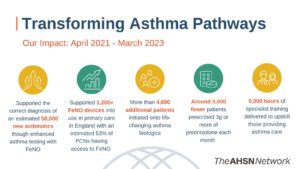Asthma is a common health condition, affecting more than 5.4 million people in the UK. Uncontrolled, severe asthma has a huge impact on the lives of 200,000 UK patients, including frequent emergency hospital admissions and serious side-effects from extended periods on steroid medication.
As a key partner of NHS England’s Accelerated Access Collaborative (AAC), the AHSN Network has supported the rollout of two asthma care innovations to improve the asthma pathway in England as part of the AAC Rapid Uptake Products (RUP) programme:
- Biologic therapies for patients with severe asthma (led by the Oxford AHSN). Asthma biologics work in a targeted way, by disrupting pathways causing airways inflammation, helping to manage symptoms and reduce exacerbations. These therapies can transform patients’ lives by reducing long-term side effects of other treatments, such as steroids, and reduce the number of life-threatening asthma attacks.
- Fractional exhaled Nitric Oxide (FeNO) testing (led by Wessex AHSN). FeNO testing is a simple, non-invasive test to measure the amount of nitric oxide in an exhaled breath – a biomarker for airway inflammation. FeNO testing can improve patient care by contributing to a faster and more effective asthma diagnosis when used alongside a detailed clinical history and other tests. It can also be used to monitor patient response to asthma treatments.
In 2020, it was noted that both innovations had lower-than-expected patient access, presenting an opportunity to improve uptake and support the NHS Long Term Plan ambition of improving early and accurate diagnosis of respiratory conditions by embedding FeNO testing in primary care and increasing access to asthma biologics through improved clinical pathways.
The two programmes focused on collaboration at a national, regional and local level across healthcare systems, industry partners, patients and the community and voluntary sector to integrate FeNO testing and access to asthma biologics into everyday clinical practice.
AHSNs worked within their individual systems to support asthma pathway improvements by taking a pathway-based transformation approach. AHSNs provided clinical and transformation leadership, shared best practice and developed education and implementation materials for those involved in providing asthma care.
A package of educational resources for each innovation – including information documents, podcasts, posters, learning modules and webinars – was created to support clinicians. These toolkits were designed in a practical way to support teams adopting and sustaining the use of FeNO and asthma biologics.
Outcomes
The programmes aimed to improve patient care and outcomes through enhanced access to diagnostics and treatments for severe asthma.
The programmes’ impacts in the two years from April 2021 to March 2023 included:
- Supporting the correct diagnosis of an estimated 58,000 new asthmatics through enhanced asthma testing with FeNO
- Supporting more than 1,200 FeNO devices into use in primary care in England with an estimated 53% of primary care networks having access to FeNO.
- More than 4,690 additional patients initiated onto life-changing asthma biologics.
- Around 3,000 fewer patients prescribed 3g or more of prednisolone each month.
- 5,000 hours of specialist training delivered to upskill those providing asthma care.
- Online resource toolkits for asthma biologics and FeNO have been accessed more than 28,000 times
Next steps
The national FeNO and asthma biologics programmes have now completed and have made substantial contributions to the transformation of asthma care in England while significantly increasing access to and adoption of FeNO and asthma biologics. Learning from the AHSN programmes is being fed into the development of NICE/SIGN/British Thoracic Society asthma guidance, expected in 2024, offering real world insights to implementation considerations.
There are opportunities to continue this work and improve asthma care by enhancing rollout of the innovations and ensure more patients can benefit. Both toolkits, training modules and other resources created during the programmes will remain accessible to NHS clinicians.
The AHSN Network is now transitioning to support healthcare inequalities as a national priority as part of NHS England’s Innovation for Healthcare Inequalities Programme (InHIP). Building on the transforming asthma pathways work, a number of AHSNs will support the respiratory aspect of the NHS England Core20PLUS5 approach, continuing to utilise the implementation and educational resources developed for the FeNO and asthma biologics national programmes.
Read more in this case study or watch our presentation on transforming asthma care at the NHS ConfedExpo event in Liverpool in June 2022.

